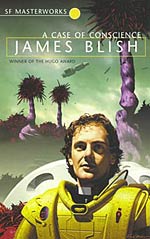
![]() Sable Aradia
Sable Aradia
2/24/2018
![]()
Read for the 12 in 12 Challenge, the Hard Core Sci-Fi Challenge, and the SF Masterworks Challenge, as well as the Science Fiction Masterworks Book Club here on Goodreads.
This book won the 1959 Hugo Award.
I loved this book! I have noticed a lot of mixed reviews here. In general, the consensus appears to be that the first half, which was a novella, is superior to the second half. I disagree, but perhaps you have to be a person of faith to grasp the implications. I am not a Catholic, which is the faith of the man suffering the theological crisis that is central to the story, but I am a dedicated Pagan priestess, and I can say that if I were in the position of this Jesuit priest, and if my theology were the same, I would see the theological conflict and the signs of affirmation of faith that I'm sure he saw. I might see what he saw; a planet of temptation by the Adversary, an anti-Christ sort of figure, and the fulfillment of God's will as detailed by my faith and my church.
On the other hand, from a purely rational point of view (which I also hold, being a rational Pagan,) this is clearly a situation of self-fulfilling prophecy, and humans are the force of darkness in this piece.
Could both things be true? Perhaps. I believe in contradictory truths in faith. My faith would not have seen the things this Jesuit priest saw. I would share the opinion of one of the other members of the original expedition, which viewed the Lithians as a good example that humanity could use to emulate. There are reasons I am not a Christian; the direct belief in the wrath of God, and the necessity of evil, are among those reasons.
I really don't want to say anything more, because I don't want to spoil the book for anyone. But it's well worth contemplating, and I think something that is worth reading (and extensively debating) in this time when faith so often seems to be in direct conflict to rationality. In Blish's book, it most certainly was.
For those who read the book through the eyes of a rationalist, I would urge you to read the book again with empathy for the protagonist, reserving your moral judgment until after you have seriously contemplated his point of view.
For those who read the book through the eyes of faith, I would urge you to read the book again, keeping in mind how blind adherence to faith may ultimately have led to atrocity.
If you're a philosopher, I urge you to read it and offer your opinion through a philosophical lens.
http://dianemorrison.wordpress.com